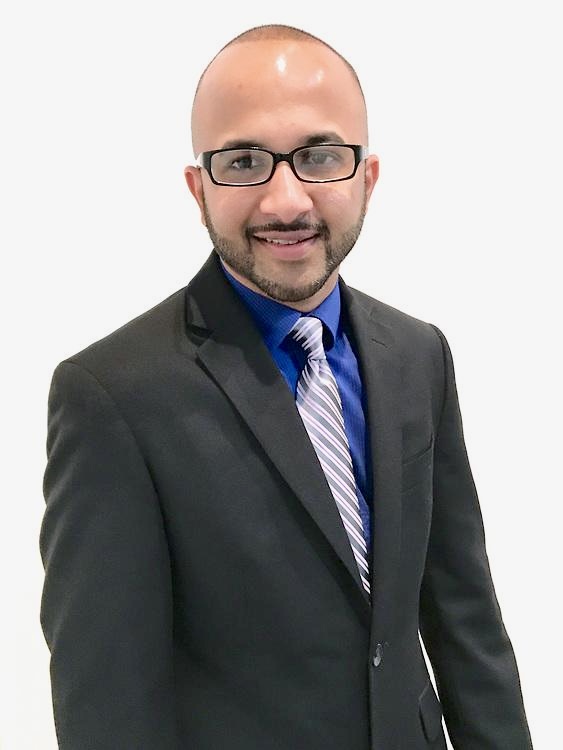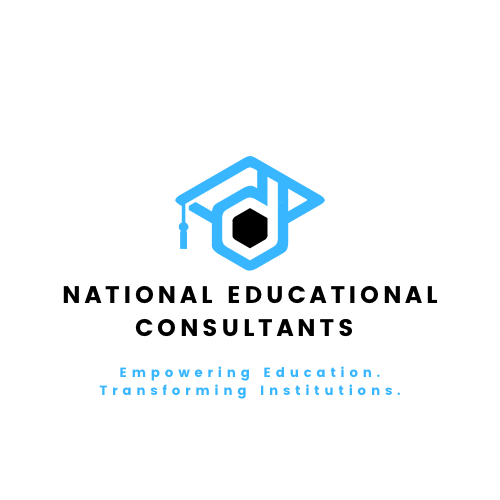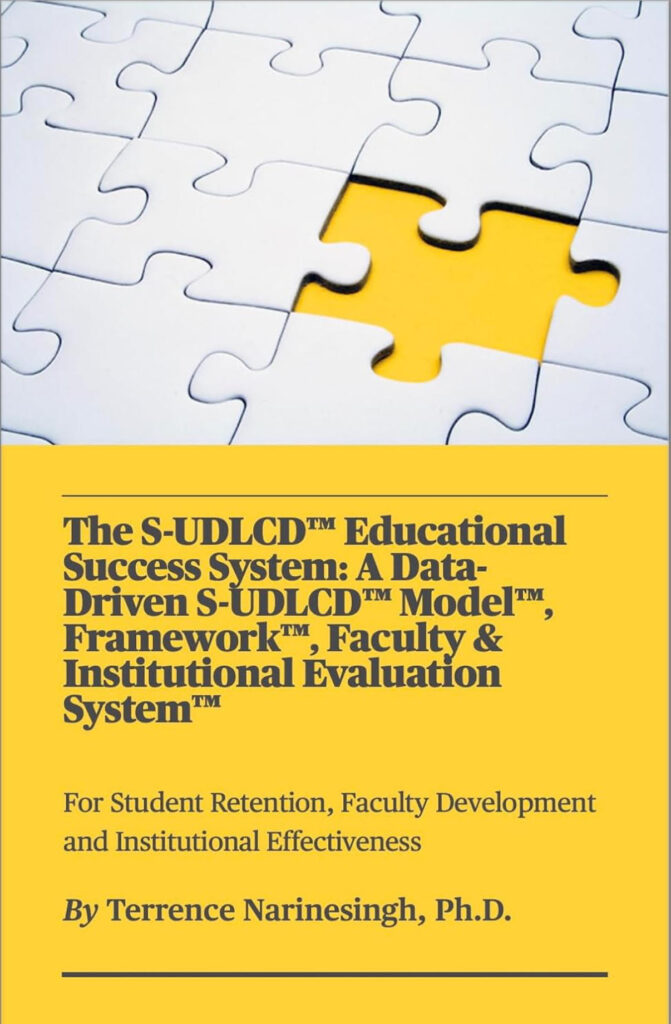Terrence Narinesingh, Ph.D.
Educational Consultant | Author | Institutional Strategist
Terrence Narinesingh, Ph.D., is a distinguished educational leader, researcher, and institutional strategist with an extensive background spanning K-12 and higher education administration, faculty development, and student success initiatives. As the author of The S-UDLCD™ Educational Success System: A Data-Driven S-UDLCD™ Model™, Framework™, Faculty & Institutional Evaluation System™, he is recognized for pioneering data-driven, evidence-based approaches to faculty evaluation, student retention, and institutional transformation.
Dr. Narinesingh has held multiple leadership positions in public school districts, higher education, and private sector consulting, including roles as a teacher, instructional specialist, curriculum and faculty developer, adjunct professor, principal, and district-level administrator. His expertise in predictive analytics, Universal Design for Learning (UDL), and Multi-Tiered Systems of Support (MTSS) has influenced national and international educational frameworks.
President & CEO, National Educational Consultants
![]() Address: 3333 N Federal Highway, Suite #511, Oakland Park, FL 33306
Address: 3333 N Federal Highway, Suite #511, Oakland Park, FL 33306
![]() Website: www.terrencenarinesingh.com/
Website: www.terrencenarinesingh.com/

As the President and CEO of National Educational Consultants, Dr. Narinesingh leads a project-driven consulting firm specializing in K-12 school improvement and higher education institutional transformation. The firm provides comprehensive consulting services for:
![]() K-12 Schools & Universities: Supporting traditional public, charter, private, and for-profit institutions.
K-12 Schools & Universities: Supporting traditional public, charter, private, and for-profit institutions.
![]() Curriculum & Course Development: Designing cutting-edge learning frameworks for higher education, K-12, and professional development programs.
Curriculum & Course Development: Designing cutting-edge learning frameworks for higher education, K-12, and professional development programs.
![]() Institutional Effectiveness & Accreditation: Assisting colleges and universities in aligning with SACSCOC, HLC, and other accrediting bodies.
Institutional Effectiveness & Accreditation: Assisting colleges and universities in aligning with SACSCOC, HLC, and other accrediting bodies.
![]() School Safety & Compliance: Implementing initiatives aligned with Alyssa’s Alert, the Marjory Stoneman Douglas High School Public Safety Act, and behavioral threat assessments.
School Safety & Compliance: Implementing initiatives aligned with Alyssa’s Alert, the Marjory Stoneman Douglas High School Public Safety Act, and behavioral threat assessments.
![]() Data-Driven Faculty & Student Success Initiatives: Integrating predictive analytics, early warning systems, and MTSS/RTI frameworks to improve retention and student engagement.
Data-Driven Faculty & Student Success Initiatives: Integrating predictive analytics, early warning systems, and MTSS/RTI frameworks to improve retention and student engagement.
![]() Grant Writing & Strategic Planning: Securing and managing K-12 tutorial grants and institutional funding opportunities.
Grant Writing & Strategic Planning: Securing and managing K-12 tutorial grants and institutional funding opportunities.
Dr. Narinesingh’s strategic leadership has directly impacted institutional performance, faculty development, and student success in both U.S. and international educational environments.
International Influence & Research Impact
Dr. Narinesingh’s global perspective extends to France, Belgium, the Netherlands, Trinidad and Tobago, Canada, Colombia, and Ecuador, where he has trained educators, administrators, and institutional leaders in transformational faculty development, student engagement, and institutional effectiveness.
His research has been widely cited in higher education, faculty assessment models, and institutional accreditation frameworks, reinforcing his reputation as a thought leader in proactive, data-driven education systems.
Leadership & Professional Experience
Dr. Narinesingh has served in multiple educational leadership roles, including:
![]() Teacher & Instructional Specialist
Teacher & Instructional Specialist
![]() Curriculum & Faculty Developer (President’s Cabinet Position)
Curriculum & Faculty Developer (President’s Cabinet Position)
![]() School & District-Level Administrator (Palm Beach, Broward, Miami-Dade, U.S. Virgin Islands)
School & District-Level Administrator (Palm Beach, Broward, Miami-Dade, U.S. Virgin Islands)
![]() Principal (COVID-19 Crisis Leadership & Virtual Learning Transition Expert)
Principal (COVID-19 Crisis Leadership & Virtual Learning Transition Expert)
![]() Disaster Response & Crisis Management Leader (Oversaw school consolidations with Red Cross & disaster relief organizations)
Disaster Response & Crisis Management Leader (Oversaw school consolidations with Red Cross & disaster relief organizations)
Dr. Narinesingh’s pioneering models for student retention, faculty development, and institutional transformation continue to shape educational practices both nationally and internationally.
Publications & Thought Leadership
 The S-UDLCD™ Educational Success System: A Data-Driven S-UDLCD™ Model™, Framework™, Faculty & Institutional Evaluation System™
The S-UDLCD™ Educational Success System: A Data-Driven S-UDLCD™ Model™, Framework™, Faculty & Institutional Evaluation System™
Publications & Research Contributions
Dr. Narinesingh is a published researcher with groundbreaking work on student retention, faculty evaluation, and educational transformation. His S-UDLCD™ Model™ and Narinesingh Traffic Light Model™ have become key frameworks in higher education effectiveness and student engagement.
Notable Research:
![]() S-UDLCD™ Faculty & Institutional Evaluation System (2023) – A research-based model for faculty effectiveness and institutional success
S-UDLCD™ Faculty & Institutional Evaluation System (2023) – A research-based model for faculty effectiveness and institutional success
![]() Narinesingh Traffic Light Model™ (2023) – A Multi-Tiered System of Support for Student Retention & Engagement
Narinesingh Traffic Light Model™ (2023) – A Multi-Tiered System of Support for Student Retention & Engagement
![]() S-UDLCD™ Framework for Student Success™ (2023) – A Data-Driven UDL Approach for K-12 & Higher Education
S-UDLCD™ Framework for Student Success™ (2023) – A Data-Driven UDL Approach for K-12 & Higher Education
![]() How Principals Can Bridge the Learning Gap Using School Leader Evaluation Models (2022)
How Principals Can Bridge the Learning Gap Using School Leader Evaluation Models (2022)
![]() A Study of the Marzano Focused School Leader & Teacher Evaluation Models (2020)
A Study of the Marzano Focused School Leader & Teacher Evaluation Models (2020)
![]() Explore Dr. Narinesingh’s Research: ResearchGate Profile
Explore Dr. Narinesingh’s Research: ResearchGate Profile
Educational Leadership & Professional Development

Ph.D. in Leadership – University of the Cumberlands

Ed.S. in Educational Leadership – Florida Atlantic University

M.S. in Exceptional Student Education – Florida Memorial University

B.S. in Biology – Florida Memorial University
Harvard University Graduate School of Education (Professional Programs)
• Including Ourselves in the Change Equation (2016) – Leadership & Organizational Performance
• Buffering Stress & Adversity Through Early Learning (2017) – Early Childhood & Trauma-Informed Teaching
• Education Redesign: Building a New Model for All (2018) – Systemic School Improvement & Equity
• The Opportunity of Bilingualism (2018) – Strategies for English Language Learners
Transform your institution today!
Dr. Narinesingh is committed to empowering institutions, faculty, and students through evidence-based strategies, innovation, and leadership excellence.
![]() For consulting inquiries, institutional partnerships, or speaking engagements, contact us at:
For consulting inquiries, institutional partnerships, or speaking engagements, contact us at:
![]() Phone: +1 (561) 235-0755
Phone: +1 (561) 235-0755
![]() Email: nationaleducationalconsultants
Email: nationaleducationalconsultants
![]() Address: 3333 N Federal Highway, Suite #511, Oakland Park, FL 33306
Address: 3333 N Federal Highway, Suite #511, Oakland Park, FL 33306
![]() Website: www.terrencenarinesingh.com/
Website: www.terrencenarinesingh.com/

